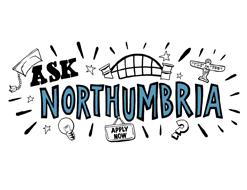-
Study
Study
Interested in studying at Northumbria? With 31,500 students, Northumbria is one of the largest universities in the country, offering courses on either a full-time, part-time or distance learning basis.
Discover more-
Undergraduate
- Undergraduate Study Degree
- Undergraduate Open Day & Events
- Application Guides
- Northumbria University UCAS Exhibitions
- Foundation Years
- Undergraduate Fees & Funding
- School & College Outreach
- Continuing Professional Development
-
Postgraduate
- Postgraduate Study Degree
- Postgraduate Research Degrees
- Postgraduate Open Days and Events
- Postgraduate Fees & Funding
- Flexible Learning
- Thinking about a Masters?
- Continuing Professional Development
- Change Direction
-
Student Life
- The Hub - Student Blog
- Accommodation
- Life in Newcastle
- Support for Students
- Careers
- Information for Parents
- Students' Union
- Northumbria Sport
-
-
International
International
Northumbria’s global footprint touches every continent across the world, through our global partnerships across 17 institutions in 10 countries, to our 277,000 strong alumni community and 150 recruitment partners – we prepare our students for the challenges of tomorrow. Discover more about how to join Northumbria’s global family or our partnerships.
Discover more-
Applying to Northumbria
- European Union
- Our London Campus
- Northumbria Pathway
- International Events
- Entry Requirements
- Agent Network
-
Northumbria Language Centre
- Faculty Requirements
- Acceptable English Requirements
- Pre-Sessional English and Study Skills
- Academic Language Skills Programmes (ALS)
-
International Fees, Funding & Scholarships
- International Undergraduate Fees
- International Undergraduate Funding
- International Masters Fees
- International Masters Funding
- International Postgraduate Research Fees
- International Postgraduate Research Funding
- International Money Matters
-
Life at Northumbria
- International student support
- The Hub - Student Blog
- Careers
-
International Mobility
- Current Northumbria Students
- Incoming Exchange Students
-
-
Business
Business
The world is changing faster than ever before. The future is there to be won by organisations who find ways to turn today's possibilities into tomorrows competitive edge. In a connected world, collaboration can be the key to success.
Discover more -
Research
Research
Northumbria is a research-rich, business-focused, professional university with a global reputation for academic quality. We conduct ground-breaking research that is responsive to the science & technology, health & well being, economic and social and arts & cultural needs for the communities
Discover more -
About Us
-
About Northumbria
- Our Strategy
- Our Staff
- Our Partners
- Student Profiles
- Alumni Profiles
- Leadership & Governance
- Academic Departments
- University Services
- History of Northumbria
- Contact us
- Online Shop
-
-
Alumni
Alumni
Northumbria University is renowned for the calibre of its business-ready graduates. Our alumni network has over 236,000 graduates based in 178 countries worldwide in a range of sectors, our alumni are making a real impact on the world.
Discover more - Work For Us
What will I learn on this module?
On this module you will learn how to develop, edit and contribute to writing projects in the real world, from poetry and short fiction anthologies to special issues of magazines, collections of reviews, and specialist blogs. You will study a range of creative and professional writing projects and produce your own, from initial pitch to writing, publicising, editing and producing the finished item. You will learn to reflect on your own writing identity and the process of writing to a brief, and how to evaluate and write a structured report on a project. You will learn from writing professionals and develop skills which prepare you for your future professional life as well as further study at level 6.
How will I learn on this module?
The module is taught through two weekly 1.5 hour sessions which will be a combination of lectures, seminars, writing exercises, writing workshops, and one-to-one tutorials.
Lectures cover key aspects of running, promoting and contributing to professional writing projects. In seminars and workshops you will develop ideas and pitch them to peers, and work collaboratively to turn the best pitches into real writing projects, under the guidance of the module tutor. You will learn to write for different projects and in response to particular briefs, and develop creative contributions to your group’s project. The sessions encourage you to think about your own writing identity and to connect your creative work with real projects and audiences, helping you to understand your studies as a preparation for your later professional life. The aim of the module is to begin developing your professional writing portfolio and give you the skills, knowledge and confidence you need in your career. The module makes appropriate use of technology enhanced learning through use of the Blackboard electronic learning platform and the online support offered by Northumbria’s SkillsPlus programme.
In addition to the scheduled lectures and seminars, you are expected to undertake both directed and independent learning. Directed learning includes preparation for lectures and workshops (including both reading and written work) individually and in groups. Independent learning includes further reading and investigation, the consolidation of seminar materials, and revision/preparation for the module assignments. The writing projects will be produced through group working and a key aim of the module is for you to learn to work collaboratively, although you will be assessed on your own individual contribution and your own reflection on the process.
How will I be supported academically on this module?
Your learning will be academically supported by peer and tutor feedback on your work within writing workshops. Your tutor will support the development and realisation of group projects, and provide one-to-one tutorial support.
The module handbook provides details of lectures, seminars, reading lists and assessment criteria; lecture PowerPoint slides are made available on the e-learning platform, together with links to relevant skills materials in the library.
The module tutor is available in lectures and seminars, as well as during office hours, to discuss any queries or concerns you have.
You are advised to see your Guidance Tutor at least twice each semester to review your academic progress. The Guidance Booklet, which you receive at the start of your first year, includes structured materials designed to help you develop your self-reflection skills. These materials underpin the academic side of the regular Guidance meetings, helping you to learn how to best use the feedback you receive on your assignments, how to build on your strengths, and improve in the areas where you could perform better.
What will I be expected to read on this module?
All modules at Northumbria include a range of reading materials that students are expected to engage with. The reading list for this module can be found at: http://readinglists.northumbria.ac.uk
(Reading List service online guide for academic staff this containing contact details for the Reading List team – http://library.northumbria.ac.uk/readinglists)
What will I be expected to achieve?
Knowledge & Understanding:
• Demonstrate an understanding of the process of developing and delivering a group writing project
Intellectual / Professional skills & abilities:
• Produce effective creative/professional writing in relation to a brief
• Work with others to edit a writing project
Personal Values Attributes (Global / Cultural awareness, Ethics, Curiosity) (PVA):
• Reflect critically on work of self and others
How will I be assessed?
Formative feedback is offered in individual 15 – 20 minute tutorials as well as through feedback in seminars and written feedback on draft materials. MLO 2, 3
Summative
Assessment 1 (100% summative):
A portfolio in two parts:
– A selection of pieces of writing which address specific briefs, totalling 2,000 words.
– A report describing and reflecting on the process of producing your group’s project, with particular reference to your individual contribution (2,000 words).
MLO 1, 2, 3, 4
Feedback will be provided using the Departmental template and comments on the script.
Pre-requisite(s)
N/A
Co-requisite(s)
EL5022; EL5023
Module abstract
N/A
Course info
UCAS Code QW38
Credits 20
Level of Study Undergraduate
Mode of Study 3 years full-time or 4 years with a placement (sandwich)/study abroad
Department Humanities
Location City Campus, Northumbria University
City Newcastle
Start September 2024 or September 2025
All information is accurate at the time of sharing.
Full time Courses are primarily delivered via on-campus face to face learning but could include elements of online learning. Most courses run as planned and as promoted on our website and via our marketing materials, but if there are any substantial changes (as determined by the Competition and Markets Authority) to a course or there is the potential that course may be withdrawn, we will notify all affected applicants as soon as possible with advice and guidance regarding their options. It is also important to be aware that optional modules listed on course pages may be subject to change depending on uptake numbers each year.
Contact time is subject to increase or decrease in line with possible restrictions imposed by the government or the University in the interest of maintaining the health and safety and wellbeing of students, staff, and visitors if this is deemed necessary in future.
Your Learning Experience
Find out about our distinctive approach at
www.northumbria.ac.uk/exp
Admissions Terms and Conditions
northumbria.ac.uk/terms
Fees and Funding
northumbria.ac.uk/fees
Admissions Policy
northumbria.ac.uk/adpolicy
Admissions Complaints Policy
northumbria.ac.uk/complaints















